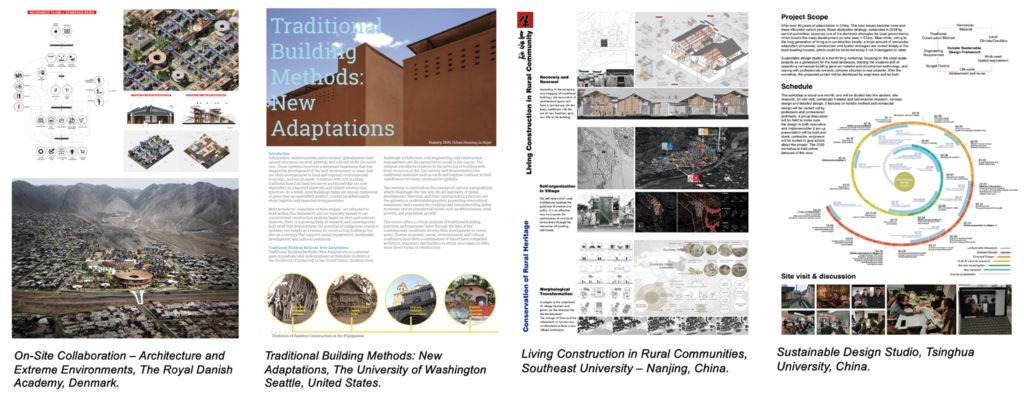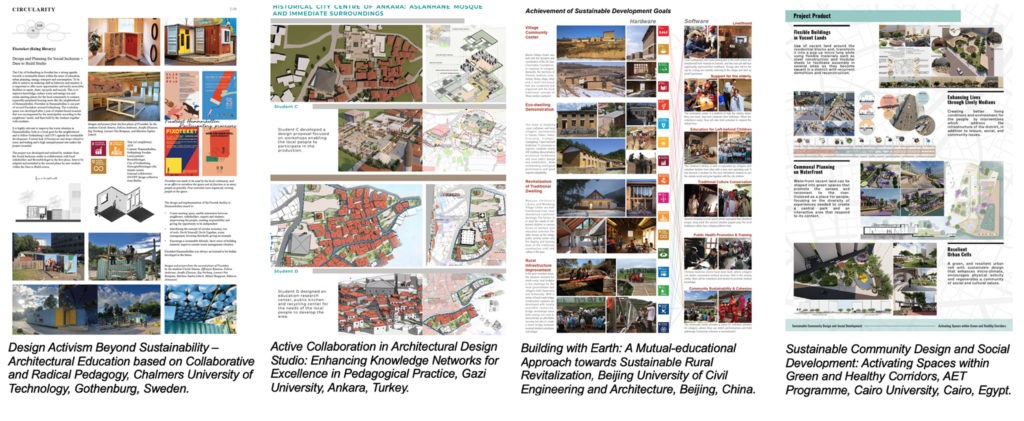
Selma Harrington and Ashraf M. Salama
Co-Directors, UIA Education Commission
The UIA Architectural Education Commission acts as a think-tank for architectural education policy, proposing guidelines, documents, proposals, and views related to education, teaching and learning practices and outcomes. Central to its key activities is the Charter of Architectural Education and the UIA Award for Innovation in Architectural Education. The latest update of the Charter involves explicit reference to Sustainable Development Goals (SDGs) as demonstrated by the general considerations and articulation of the objectives of architectural education. Under the general considerations section, three striking references to SDGs can be seen in various statements (See Charter July 2023 Edition). Efforts of the UIA Education Commission have advanced significantly over recent years. There is a clear commitment to SDGs manifested through a series of statements that refer to ecologically responsible design, environmental conservation and rehabilitation, public health and well-being, and transdisciplinary knowledge production. Such a commitment is articulated through one the key activities of the commission, the UIA Award for Innovation in Architectural Education.
The UIA Award for Innovation in Architectural Education
In November 2019, the UIA Education Commission initiated the UIA Innovation in Architectural Education Award to promote best practices in pedagogy and sustainable built environments. Open globally to architecture institutions, the award recognizes innovative pedagogical approaches that foster sustainability across diverse cultural contexts. Aligned with the UNESCO/UIA Charter for Architectural Education, it emphasizes addressing societal and environmental challenges while highlighting opportunities. The award’s key criteria include excellence in pedagogy and shaping a sustainable future.
The inaugural edition (2019-2021)
In its 2019 debut, the UIA Innovation in Architectural Education Award received submissions from nine countries across four continents, with sixteen projects shortlisted by an international jury comprising academics and professionals including Oya Atalay Franck, Harriet Harriss, Derya Oktay, Konstantin Kiyanenko, Thomas Fisher, Beatriz Maturana Cossio, Mustapha Mohd Saleh, Lindy Osborne Burton, Carin Smuts, and Hassan Radoine. Notably, the lead author was the award’s curator, and one of the jury members served as co-author. Among the awarded entries were:
- The Royal Danish Academy’s program ‘Architectural Education Through On-Site Collaboration – Architecture and Extreme Environments,’ lauded for its commitment to addressing UN Sustainable Development Goals and integrating research into design.
- The University of Washington’s seminar on ‘Traditional Building Methods: New Adaptations,’ commended for its interdisciplinary approach and focus on experiential learning.
- The School of Architecture at Southeast University’s program ‘Living Construction in Rural Communities,’ praised for its integration of architectural, cultural, social, and environmental education, particularly focusing on rural community needs.
- The School of Architecture at Tsinghua University’s ‘Sustainable Design Studio,’ recognized for its pedagogical approach rooted in sustainability and hands-on learning experiences.

Figure 1: Representative posters of each of the four entries awarded for their excellence in addressing Sustainable Development Goals in 2021.
These projects showcased various approaches to integrating Sustainable Development Goals (SDGs) into architectural education. Additionally, the jury commended three other entries for their efforts in bridging gaps between architects, communities, and built environment disciplines.
The second edition (2021-2023)
In its second edition (2021-2023), the UIA Innovation in Architectural Education Award placed a greater emphasis on Sustainable Development Goals (SDGs) in both its title and criteria. The key criteria remained excellence in pedagogical practice and addressing SDGs, with further elaboration. Entries were expected to demonstrate excellence by adopting pedagogical approaches aligned with SDGs, inspiring students’ commitment to addressing social and environmental challenges, catering to diverse learning needs, integrating architectural research and professional practice, engaging across disciplines, and identifying strategic priorities of the context or region. The jury, chaired by Deniz Incedayi and including Martha Thorne, Howaida Al-Harithy, Michael J. Crosbie, Hermie Delport, and Efthalia -Thaleia Grigoriadou, shortlisted fifteen submissions from twelve countries out of over 35 registrations. Four entries were awarded based on their alignment with SDGs.
- Chalmers University of Technology’s Department of Architecture and Civil Engineering in Gothenburg (Sweden) presented ‘Design Activism Beyond Sustainability – Architectural Education based on Collaborative and Radical Pedagogy’ by Emilio Brandao, Shea Hagy Marco Adelfio, and Liane Thuvander. This programme prioritised experiential learning to develop hyper-local solutions for real-world challenges, fostering a holistic understanding of sustainable development.
- Gazi University’s Department of Architecture in Ankara (Turkey) showcased ‘Active Collaboration in Architectural Design Studio: Enhancing Knowledge Networks for Excellence in Pedagogical Practice’ by Semra Arslan Selçuk, Esra Özkan Yazgan, and Aysenur Coskun. This studio emphasised community service and retrofitting, highlighting sustainability’s importance through various scales of built environment cases.
- Beijing University of Civil Engineering and Architecture (China) presented ‘Building with Earth: A Mutual-educational Approach towards Sustainable Rural Revitalisation Empowered by Traditional Wisdom’ by Mu Jun, Hao Shimeng, Jiang Wei, Zhou Tiegang, Jin Yibing, and Ren Zhongqi. The programme engaged diverse participants in direct collaboration with villagers, facilitating mutual learning.
- Cairo University’s Faculty of Engineering (Egypt) featured ‘Sustainable Community Design and Social Development: Activating Spaces within Green and Healthy Corridors’ by Heba Allah Essam E. Khalil. This studio integrated action research and various pedagogical tools to empower students in identifying and intervening in urban areas for sustainable community development.

Figure 2: Representative posters of each of the four entries awarded for their excellence in addressing Sustainable Development Goals in 2023.
The four awarded projects bridged gaps between architecture and other disciplines, communities, theory and practice, and campus and context. They challenge misconceptions about sustainable architecture’s purely physical nature and traditional pedagogical practices in architecture. These projects offer compelling pathways for achieving a sustainable built environment. Additionally, an Honourable Mention was given to Tianjin University’s Department of Architecture for their entry ‘Designing with Nature and Equality,’ which emphasises equality as a design parameter and showcases a decade-long impact on shaping sustainability globally through interdisciplinary research.
The great value of sharing best practices and local approaches is very rewarding to all. Underscoring the importance of integrating SDGs into architectural education and design pedagogy the Award aligns with the UNESCO-UIA Charter for Architectural Education and with the Architectural Guide for UN SDGs. It emphasises the role of architectural education in addressing the societal and environmental challenges facing the built environment, and in articulating the opportunities those challenges create. It recognises the multitude of factors influencing the development of sustainable environments, whichinclude focus areas ranging from climate action to health; from inclusivity and migration to community development; and from resource efficiency to community revitalisation.